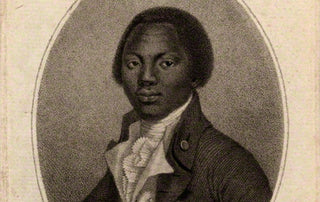In the eighteenth century the transatlantic slave trade had reached a level where, every year, tens of thousands of African people were transported under appalling conditions to the New World. Many Christians fought against slavery and the names of William Wilberforce, John Newton and Hannah More are widely remembered. Less well-known is the name of Olaudah Equiano, a man whose witness was particularly powerful because he himself had been a slave.
Much of what we know about Olaudah Equiano comes from his remarkable autobiography which became a bestseller at the end of the eighteenth century. In his book, Equiano tells us he was born in 1745 in what is now Nigeria to the Igbo people and, as a boy, was kidnapped by slave traders. After a succession of owners, he was transported on a slave ship across the Atlantic to the West Indies, and from there to the colony of Virginia.
In 1754 Equiano was bought by a lieutenant in the Royal Navy who gave him the name ‘Gustavus Vassa’ after the sixteenth-century Swedish king. Equiano bore this slave name for most of his life. His master took him on active service during the Seven Years War of 1756 to 1763. Equiano, now a trained seaman, served on the guns during hard-fought naval battles off Canada, Portugal and France. Intelligent and eager to educate himself, he was allowed to learn to read and write: a privilege denied to most slaves.
In 1759 Equiano was sold on to another captain and transported back to the Caribbean, only to be sold again to a gentle American merchant who allowed him to do some trading of his own. Equiano soon made enough money (well over £5000 sterling in today’s terms) to buy his own freedom. Having become a qualified mariner, he then spent a decade on ships in the Atlantic and Mediterranean. He even sailed with a teenage Horatio Nelson on a scientific voyage to seek access to the North Pole. Significantly at this time in his life Equiano seems to have accepted the slave trade and even went to Central America to manage a sugar cane plantation that involved slaves. It failed and he returned to London.
After a long spiritual search Equiano had a life-changing conversion to Christ in 1775. His attitude to slavery was dramatically altered and he began to be involved in the fight to have it legally abolished. Equiano soon became an invaluable witness to a trade that was little known and little discussed in Britain. He spoke publicly, wrote letters and encouraged and advised the abolitionist campaign.
By now Equiano had become a respectable English gentleman. He was well connected through the antislavery movement and over the years had educated himself to the point where he was well read. He used his new status to act as something of a spokesman for the large and often impoverished black community in London. Recovering his Igbo name, he now became increasingly known as ‘Olaudah Equiano the African’.
Aware of Equiano’s importance as a key witness, the abolitionists encouraged him to write an account of his life. His autobiography, The Interesting Narrative of the Life of Olaudah Equiano or Gustavus Vassa, the African, was published in 1789. A well-written book that was, by turns, thrilling, horrifying and spiritually uplifting, it soon became a bestseller and was the first major publication by an African writer in Britain. Equiano helped the success of the book and its cause by speaking across the nation.
In 1792 Equiano married an Englishwoman and together they had two daughters. He died in 1797, ten years before Parliament declared slave trade illegal throughout the British Empire.
Why is Equiano a hero?
Consider what he did. Equiano had become a successful businessman by the 1770s and could have forgotten his past and settled down to a quiet, comfortable life in England. But he didn’t. With that holy indignation that is so common amongst Christian heroes, he remembered his people and decided that something had to be done for them. So he set out to challenge the profitable and powerful slave industry. That was heroic.
Consider how he did it. Having decided to act, Equiano used every means available to him against slavery. Two common defences of slavery were, first, that it was a harmless economic activity; and secondly, that, anyway, Africans were inferior beings. Equiano attacked both. He described events which left in no doubt the brutality of slavery, and through his cultured and gentle presence and his autobiography reminded his audience that those who were being taken into slavery were truly human. Equiano was also shrewd in his treatment of the slave trade: he described its horrors but at the same time acknowledged that not all slaveowners were brutal. He appealed to the Christian conscience, asking whether slavery was consistent with Jesus’ rule: ‘Do unto others as you would have them do unto you.’ Equiano mounted a wide-ranging attack on slavery that was not easy to counter. There are lessons here for Christian campaigners.
Consider why he did it. As an evangelist what I find fascinating about Equiano’s story is that although for some years he had been, at least nominally, a Christian – baptised, a church attender and someone trying to do good – it wasn’t enough. He had become personally compromised in the trade that he despised. It was only when he was converted to a living faith in Christ that Equiano realised the true horror of slavery and found his mission in life.
The gospel changed Equiano’s life. The gospel changes lives today.
J.John
Reverend Canon




